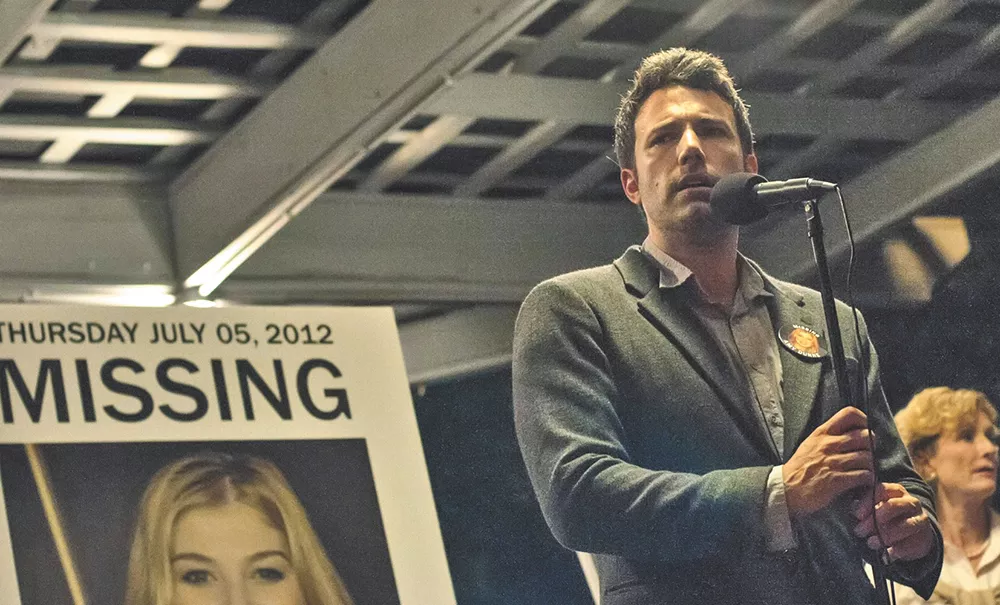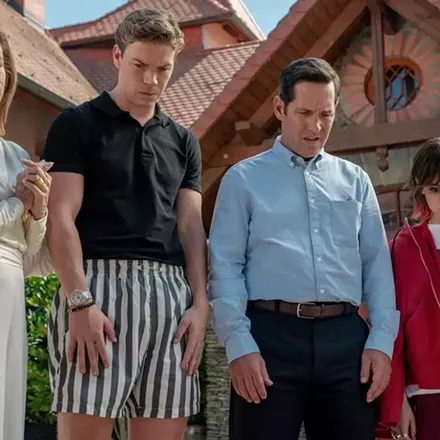How the hell do I write a review of a movie that would require me to insert the word "spoiler" at the beginning of every paragraph? I started wondering about this at about the halfway point of David Fincher's twisting, turning, anxiety-inducing, highly entertaining film taken from the novel by Gillian Flynn (who also wrote the screenplay).
I'm quite happy that I hadn't read Gone Girl, because I had no idea what was coming, no clue that almost every plot point I was seeing would be something I couldn't mention. With that in mind, I had to find a way to review the damn thing, but not ruin its impact for anyone else who hadn't read the book, who didn't know what swerves were going to be thrown at them. I think I've got it, so read on; I won't give anything (important) away.
The film opens with a soft voice-over by protagonist Nick Dunne (Ben Affleck), sharing some dark thoughts about the institution of marriage while we gaze at the warm, smiling face of the film's other protagonist, Amy Dunne (Rosamund Pike) — his wife.
And we're off, jumping all over the place in time and geography. It's the morning of Nick and Amy's fifth anniversary, and he's over at the bar he owns with his sister Margot (Carrie Coon), swilling down some whiskey at 11 o'clock, ruminating to Margot, obviously not for the first time, about the problems in his marriage. A phone call sends him scampering home to find the door open, the cat outside, the house a smashed-up wreck, and Amy nowhere to be found.
Flash back to Nick and Amy meeting and flirting five or so years earlier.
Flash forward to the present, with two detectives checking out the house, while a remarkably collected Nick nonchalantly asks them, "Should I be concerned?"
Flash back to Amy writing in a journal about how happy she is that she's getting married.
Flash forward to Nick at the police station, where they're taking a sample of his saliva.
Back and forth. Present and past. It's Nick's story now, and Amy's story then. And soon, with neighbors and parents and the press getting wind of this disappearance, the world knows — at least the people who are fascinated by sensationalism.
The cops: How come Amy didn't have any friends?
The journal: All is good in this marriage.
Nick (to himself): I'm not gonna break a sweat over this.
Margot: Nick, you'd better hire that expensive, hotshot lawyer, Tanner Bolt (Tyler Perry).
Tanner (to himself): Whoa! This is gonna be a good case!
Somewhere in the middle of all of this, mention is made of Desi (Neil Patrick Harris), an old boyfriend of Amy's who she unceremoniously dumped when she realized he was completely obsessed with her. Oh, yeah, he eventually comes into play in the present.
This is a film that never stops getting more complicated, in which tides keep turning for both protagonists. And it's told under the shrewd guidance of the always inventive David Fincher, a director who likes to examine people's faces, make us believe we know what they're thinking, then throw us an off-speed curve ball. He also, from time to time, enjoys going all cinematic on us (check out his floating camera moves in Panic Room), in this case placing an arguing couple in a dark room while bursts of light from news cameras outside the house come eerily flashing through the window slats.
Gone Girl stands as a scathing statement against ratings-starved TV newspeople and a hungry, gullible public. It's riveting from the first frame right to the unsettling end. ♦




















